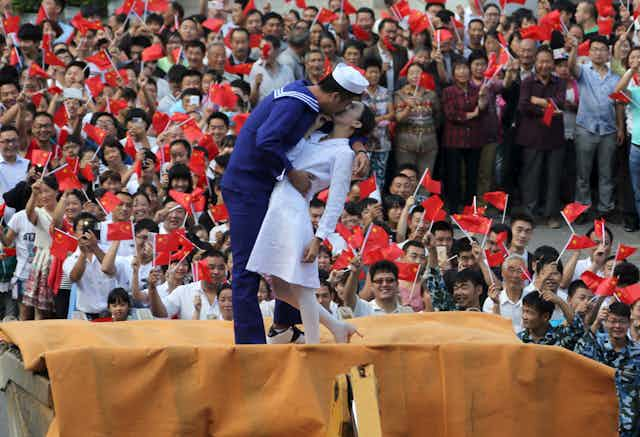When did the second world war start? For most people in the West this doesn’t sound like a difficult question. The answer varies, however, depending on who you ask. Back in 1944 US soldiers deployed to the Asian front were already made aware that no simple answer existed. The US Army issued a short booklet for its soldiers which reminded them:
Ask the average GI when World War II started, and he is likely to reply: December 7, 1941. Ask the same question of any British Tommy, and the answer is almost certain to be: September 3, 1939. But if this question is put to one of our Chinese allies, his date of the start of the war will be either: September 18, 1931, or July 7, 1937.
Seventy years after Japan’s official surrender, I find myself in the same position reminding my students every semester that the second world war was truly about the world and that China was one of the Allies fighting on the same side as Western nations.
It is probably not a coincidence that as we mark the 70th anniversary of the end of the war a growing literature is in effect setting the record straight and, in Rana Mitter’s words, recasting the role played by the war’s “forgotten ally”.
Fighting a common enemy, both Mao Zedong and Chiang Kai-shek saw the war as a global struggle against fascism. It was a struggle that would not only define the survival of China but also lay the basis of China’s future in a new international order.
This was a global war and as such it had a profound impact on the internationalisation of China. For example, Eastern European doctors who fought in the Spanish Civil War (1936-1939) against Franco arrived in China through the auspices of the International Red Cross. The same call of duty also inspired intellectuals such as the young British art historian Michael Sullivan.
Along with driving supplies in Guiyang, Sullivan later made modern Chinese art known in the West through his friendship with Chinese artists such as Wu Zuoren and cartoonist Ding Cong. More senior figures such as Joseph Needham headed the Sino-British Science Co-operation Office assisting Chinese scholars working under the hardship of wartime conditions in China’s south-west.
A growing say in world affairs
It would be wrong to see this as a story of the powerful West coming to the rescue of a hapless Chinese nation. It is rather one of Chinese intellectuals who saw themselves as a part of a global community of scientists and humanists fighting against the evils of fascism. They were eager to use the tools of their trade to shape postwar society in frank debates with their Western counterparts.
The contributions of Chinese scholars such as the philosopher Luo Zhongshu in the establishment of UNESCO and to the Universal Declaration of Human Rights reminds us of the important internationalist legacy of the war from a Chinese perspective. In many ways the empowerment of Chinese scholars in these debates heralded the growing tide of decolonisation and the rise of what we now regard as the Global South.

China’s internationalisation during the war wasn’t just confined to intellectuals. Two of China’s main cities in the south-west at the time, Chongqing (the wartime capital) and Kunming, were bustling with foreign diplomats and soldiers who interacted with Chinese society at all levels.
Governments in exile such as the Korean Provisional Government were based in Chongqing, mirroring the eventual showdown occurring later in Europe after the war was over between the London and Lublin Poles.
The international can also emerge in unexpected ways. Back in 1993, as a young backpacker enjoying noodles in Kunming, I was approached by an old man asking me in perfect English whether I had any foreign coins he could add to his collection. I obliged and before hurrying away he quickly explained that he had picked up English as a boy chatting with US pilots based at the local airfield. Stories of the international in these casual encounters are yet to be revisited by historians.
On September 3, the day after Japan officially surrendered to China, a number of official events will commemorate the end of the war at the local, provincial and national level. Against the backdrop of a military parade attended by China’s top leaders (and only a few foreign ones), these will no doubt honour China’s wartime role, claiming to foster international peace while bolstering nationalism for its young amid an uneasy relationship with Japan.
While this process of commemoration is already taking place at sites such as the Nanjing Massacre Memorial Hall, it might well be the moment to look beyond official accounts and find other ways to remember the international in what was probably the most nationalist of wars in China’s modern history.

